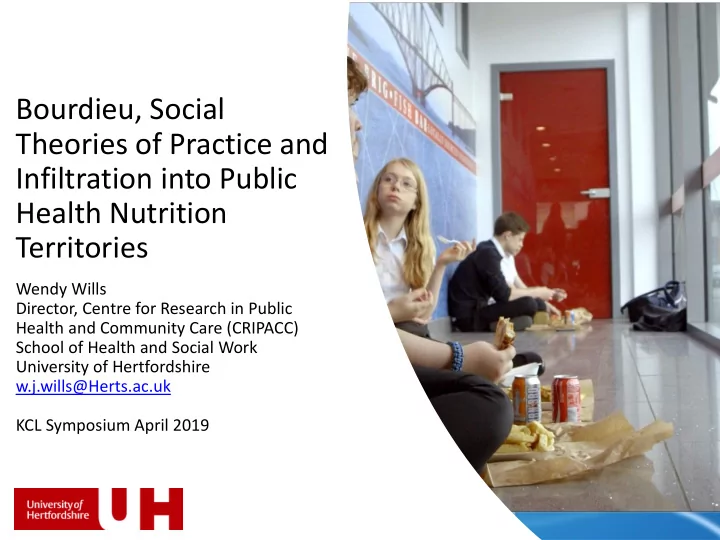

Bourdieu, Social Theories of Practice and Infiltration into Public Health Nutrition Territories Wendy Wills Director, Centre for Research in Public Health and Community Care (CRIPACC) School of Health and Social Work University of Hertfordshire w.j.wills@Herts.ac.uk KCL Symposium April 2019
• Eating is not driven by conscious decision- making or ‘freedom of choice’ - It is a result of habitus • We all develop an automatic, unconscious capacity to act in a way that Bourdieu is meaningful in our social context • Food, eating and ‘tastes’ – relate to and Social cultural, social and economic capital • Therefore unspoken moral boundary Distinctions work might shape what groups consider ‘tasty’ or ‘disgusting’ • How does this underscore /reflect the reality of poverty, disadvantage or affluence?
A practices approach to understanding [eating] behaviours • “A practice . . . is a routinised type of behaviour which consists of several elements, interconnected to one another: forms of bodily activities, forms of mental activities, things and their use, a background knowledge in the form of understanding, knowhow, states of emotion and motivational knowledge” (Reckwitz, 2002: 249 – 50) • Practices encompass three domains (Warde 2005): – The people who shape/ perform practices – The available resources – The meaning given to the practice • Individuals can be viewed as ‘carriers of practices’ ( Warde 2005) – one part of the jigsaw puzzle
A practices approach to understanding [eating] behaviours • Practice frameworks account for the entangled nature of relational events, things people and places – it provides context for the ‘doings and sayings’ (Schatzki 1996) of everyday life • Practices are performed repetitively with little reflection (we have a ‘feel for the game’ (Bourdieu 1984)
The ‘beyond the school gate’ project Food Standards Scotland [grant number FS411002] ‘if [parents] work it’s not fair, it doesn’t mean • they can afford it’ The aim of this study was to [young person] explore the influence of the ‘They kick us out food environment (the type and early’ ; ‘ the density of outlets; marketing [school] café should be just for and promotion initiatives), us’ [young person] socio-economic deprivation and other factors (such as peer “…every and family influence) on the customer’s important to me food and drink purchased at …so if you treat lunchtime by secondary school them [pupils] with pupils beyond the school gate in respect generally Scotland. they’re okay” (Newsagent)
Socially defined places and spaces
Food acquisition in later life ESRC: ES/M00306X/1
Considerations for Influencing Public Health Practice • METHODOLOGICAL APPROACHES to take account of the complexity of public health challenges and “real life” contexts • EVALUATE using realist evaluation frameworks (Pawson and Tilley 1997) – Generative principles • ‘what works in which circumstances and for whom?’ • SOCIAL NETWORKS, encounters, relationships and social capital matter [ensure ‘systems’ approaches are ‘social…]
From sociological research to innovative outputs/impact…
Recommend
More recommend